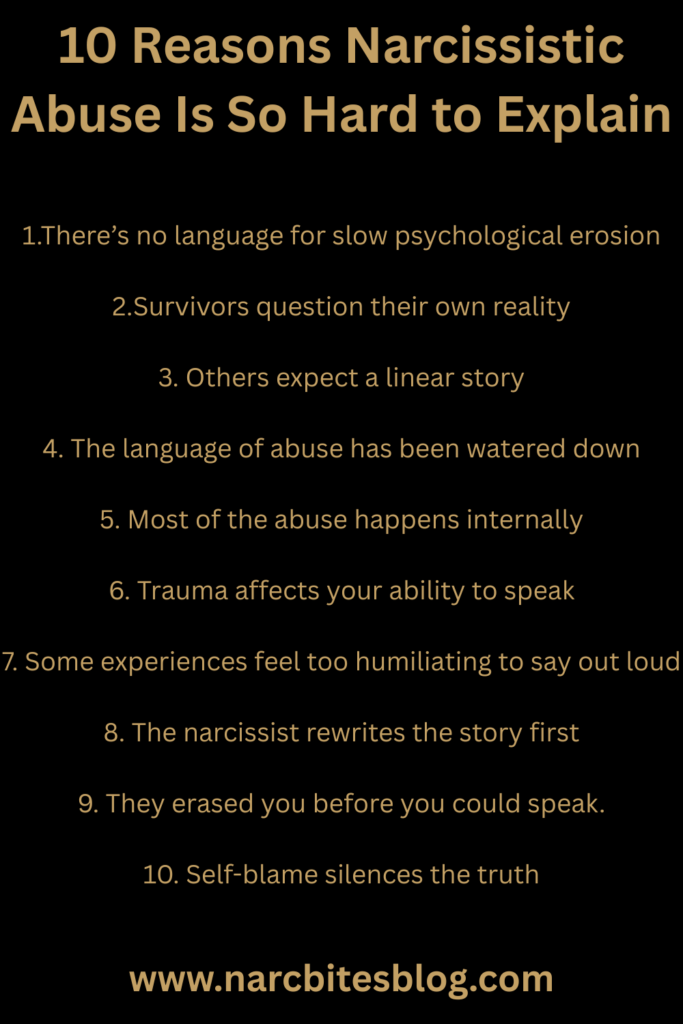Have you ever tried explaining narcissistic abuse to someone who hasn’t lived it?
You can see the confusion in their eyes. The way they pause when you talk about “feeling crazy” or “not recognizing yourself anymore.” It’s not that they don’t believe you. It’s that the story sounds unreal—like something from a psychological thriller, not real life. Narcissistic abuse doesn’t leave bruises, and that’s part of what makes explaining narcissistic abuse feel impossible.
People expect abuse to look like shouting, name-calling, or violence. But narcissistic abuse is insidious. It’s subtle. It’s strategic. And perhaps most painfully, it’s invisible.
The hardest part of narcissistic abuse isn’t just surviving it. It’s talking about it afterward. It’s putting words to something that was meant to leave no evidence. This type of abuse works like smoke: it’s present, it suffocates, it fills the room—and yet you can’t hold it in your hands.
So why is it so notoriously difficult to explain?
Let’s go deeper into the reasons.
1. There’s No Language for Slow Psychological Erosion
You can explain a punch. You can describe a slap. You can photograph a bruise. But how do you explain the emotional erosion that happens over months or years?
How do you verbalize the experience of losing your ability to make small decisions because you’re afraid of upsetting someone? Or explain why you apologized for things that weren’t your fault—daily, obsessively, ritualistically?
The abuse doesn’t come in explosions. It comes in drops. Each one small, deniable, easily dismissed. A sigh. A glare. A comment designed to unsettle. No single moment looks like abuse. But the accumulation is devastating. There’s no vocabulary for that kind of slow-motion collapse.
Try telling someone, “I wasn’t allowed to disagree,” or “I was afraid to laugh too loud.” It sounds petty—unless they’ve lived it.
Even therapists, if untrained in narcissistic abuse dynamics, can struggle to validate what they cannot quantify. When victims try to explain these experiences to professionals, they may be met with generic advice like, “communicate your needs”—never realizing that needs were the very thing that triggered punishment in the first place
2. Survivors Question Their Own Narrative
By the time someone leaves a narcissistic relationship, they’ve usually been gaslit into doubting their entire reality. Memory becomes patchy. Confidence collapses. Even basic emotions feel foreign.
You think, Maybe it wasn’t that bad. Or I’m probably exaggerating.
So when someone asks, “What happened?”, you stammer. You second-guess yourself. You tell half a story and then backpedal. Not because you’re unsure it happened, but because you’re unsure you’re allowed to say it out loud.
You remember what it was like when you did speak up and were punished with the silent treatment for days. Or accused of being too dramatic. Or made to feel guilty for bringing up your feelings at all.
The abuse teaches you to self-censor. That conditioning doesn’t vanish the moment you walk away—and it lingers every time you try explaining narcissistic abuse.
3. Others Expect a Linear Story, but the Experience Is Chaotic
When survivors attempt to explain what they went through, they often get tangled. Not because they’re lying, but because the story is nonlinear. It wasn’t just one bad moment. It was a thousand conflicting moments—some of them wonderful.
How do you explain that the same person who made you feel adored also made you feel invisible? How do you put into words the confusion of being praised in the morning and humiliated by night?
You might start a story and pause midway: “Wait, I forgot to mention—before that happened, they had just complimented me.” That inconsistency sounds suspicious to outsiders. But in a narcissistic relationship, that inconsistency was the abuse.
Linear storytelling fails here. Narcissistic abuse is recursive. You go back, forward, sideways. And in trying to communicate that, you risk sounding unbelievable.
4. The Language of Abuse Has Been Co-Opted and Watered Down
“Gaslighting,” “toxic,” “narcissist”—these words are everywhere now. They’ve entered pop culture, memes, and dating advice columns. But their overuse has diluted their meaning. So when someone finally tries to speak the truth—actual narcissistic abuse—it sounds like an overreaction. The language has been cheapened. It no longer carries weight.
This leads survivors to think, I don’t want to sound dramatic, or They’ll just think I’m bitter. So they go quiet. Again.
You know what you want to say, but it all sounds cliché now. The words you reach for feel like borrowed language from an Instagram post—not raw truth. And so you say nothing.
5. Much of the Abuse Was Internal
One of the most tragic outcomes of narcissistic abuse is the way it invades your internal world. Eventually, the narcissist’s voice becomes your own. You don’t need them to belittle you—you do it to yourself.
You think you’re broken. Too sensitive. Overreacting. You minimize your own pain before anyone else has the chance to.
You become your own silencer.
How do you explain abuse that happened inside your own head?
How do you describe the loop that plays when you try to feel joy and a voice inside whispers, That’s not allowed?
6. The Nervous System Response Interferes with Speech
Trauma impacts the body. This isn’t just emotional—it’s physiological. During and after narcissistic abuse, the nervous system becomes dysregulated. You’re in chronic fight, flight, or freeze.
When you try to explain what happened, you might freeze. Go blank. Lose your words. Feel your throat tighten. You’re not being evasive. Your body is reacting as if the danger is still present.
This bodily reaction can make survivors appear unsure or evasive—even to themselves. But it’s not memory failure. It’s survival mode.
A survivor might say, “I don’t remember everything, but I remember the way I felt every morning—like I was bracing for impact.”
That visceral memory, the body’s memory, is often clearer than any sequence of events. And because the story is stored in sensation rather than language, it becomes nearly impossible to explain in a way others can grasp.
7. Some Experiences Are Impossible to Put into Words
There are moments in narcissistic abuse that feel too humiliating or absurd to say out loud.
How do you explain that you were made to feel guilty for crying? That you apologized for making dinner wrong—when there were no instructions? That you were punished for looking tired?
It sounds ridiculous. Until you realize the absurdity was the point. The narcissist’s goal is not just to control you—but to make you lose faith in your own emotional logic. You hesitate to explain it, because you’re afraid of being laughed at—or worse, disbelieved.
Sometimes the abuse is designed to be so irrational that even describing it makes the victim feel unstable. That shame becomes a muzzle.
8. The Narcissist Rewrites the Narrative First
Long before you get the chance to tell your story, the narcissist has already rewritten it.
They’ve told your friends you’re unstable. They’ve posted about their heartbreak. They’ve played the victim. They’ve laid the groundwork for everyone to question you before you speak.
So when you finally muster the courage to start explaining narcissistic abuse, the damage is done. The audience is already primed to doubt you.
This forces you into silence not because you have no story, but because the stage has been sabotaged.
Opening your mouth and feel the weight of already-lost credibility. You’re not just telling your story—you’re fighting theirs.
9. You Weren’t Supposed to Survive
Narcissistic abuse is built to dismantle identity. It wants you small. Silent. Erased.
So surviving it—having a voice again—already goes against the design. Explaining it? That’s revolutionary.
It’s reclaiming ground you weren’t supposed to stand on. That’s why it’s so hard. Because you’re not just telling a story.
You’re contradicting the one that was written about you.
10. Why Explaining Narcissistic Abuse Often Turns Into Self-Blame
Before they explain it to anyone else, survivors usually spend months—sometimes years—explaining it to themselves. Trying to understand why they stayed. Why they didn’t fight harder. Why they didn’t leave sooner.
Self-blame is often easier than facing the reality that someone systematically broke them down.
It feels safer to believe it was your fault than to accept that someone deliberately harmed you for their own gain.
So when the time comes to speak out, that internalized blame still lingers. It whispers, Maybe I deserved it. Maybe I overreacted. And with that thought, the voice dies in your throat.
You Don’t Owe a Perfect Explanation
The pain is real, even if the words aren’t tidy. The damage counts, even if you can’t recount it in order.
If you’ve been struggling to explain what happened to you, it’s not because you’re weak. It’s because the abuse was designed to be unspeakable. You don’t need perfect language to prove it. Your story still matters.
Even in fragments. Even in silence. Even in rage, or grief, or blank stares.
You lived it. You know what it was. That’s enough.



